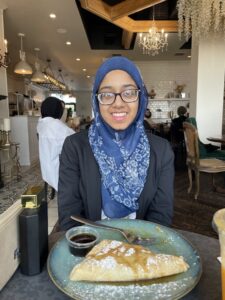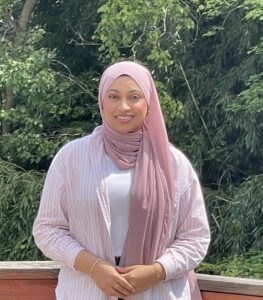MEET OUR 2024-2025 COHORT

Ramlah Amsa – Working with Professor Haniyeh Barahouie Pasandi in the French department, I completed a comparative literary analysis to determine if the different dialects of one language can result in similar pieces of literature. I analyzed the graphic novels of Guy Delisle, a Quebecer author, and Riad Sattouf, a French-Syrian author, for their linguistic aspects, artistic choices, and portrayals of the Eastern and Western worlds. This offered an innovative approach to understanding transnational stories. Does language or upbringing have a more significant impact on a person’s mindset and perception of worldviews? How does personal bias play a role in a person’s representation of a region? With this research, graphic novel readers can determine if they identify with one country more than another (based on the author from that country) and can think critically about the media they consume.

Ramsha Chaudhary – Under the guidance of Dr. David Beard, I explored how language barriers influence the quality of care received by Spanish-speaking patients during visits to the emergency department. This project entailed an exploration of language as a social determinant of health, with a focus on the Baltimore City area in particular. I accomplished this task via interviews with physicians, Spanish interpreters, and Spanish-speaking patients in order to gain a firm understanding of the issue at hand. Additionally, I assessed current solutions in place, such as digital interpreter services, to determine the effectiveness of such solutions and elucidate new ways to maximize our ability to address care gaps due to language barriers.
